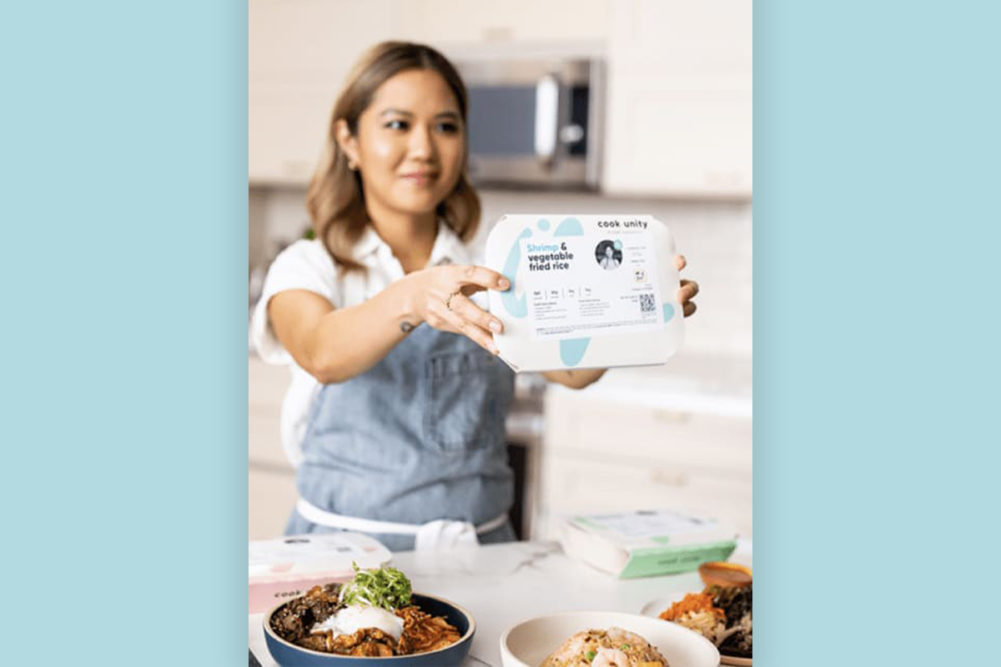CHICAGO – In 2015, when meal delivery services were starting to gain traction, Mateo Marietti was unsatisfied with the options available and developed the concept of CookUnity. Today, the subscription-based service has seven kitchens across the country in New York (Brooklyn); Los Angeles; Austin, Texas; Chicago; Seattle; Atlanta; and Miami, with delivery available nationwide.
“We are reinventing the food delivery experience,” said Mr. Marietti, co-founder and chief operating officer. “CookUnity makes it easy for busy people to eat well at home by curating a marketplace of great chefs and unique crafters.”
CookUnity has grown three times year-over-year. This time last year the company only serviced the Northeast.
“We now tap into the local chefs and culinary scenes across seven markets,” said Hew Loyd, chief marketing officer. “With a roster of 60 chefs, and 20-plus chefs having joined just this quarter, the company is projecting an increase to more than 150 chefs across all kitchens within the year. This will only multiply the variety of our cuisines and meals, which unlocks more opportunities to attract like-minded eaters and to delight our members.”
In September 2021, the company closed a $47 million Series B funding round. That funding round came on the heels of the company’s $15.5 million Series A round announced eight months prior, bringing CookUnity’s to-date total funds raised to $70 million.
“We are the very first chef-direct marketplace,” Mr. Loyd said. “Unlike prepared meal delivery services and standard prepared food subscriptions, CookUnity has built a marketplace that supports both chef and eater equally. We are revolutionizing access.”
The chefs come with their tested recipes and years-earned talent to the CookUnity kitchens. CookUnity procures the ingredients and the packaging and manages shipping, delivery and marketing to scale the chefs’ businesses.
The business model allows CookUnity to deliver elevated, restaurant-quality cuisine at a fraction of the cost when compared to eating at restaurants or using some restaurant delivery platforms, said Mr. Loyd.
“The chefs are at the core of the brand,” he said. “Without them the business model does not work. So, we provide a convenient place for them to create and produce outside of the restaurant model.”
Unique to CookUnity, the chefs — some with teams — create and prepare each dish themselves. With each meal, diners are experiencing curated recipes and the chef’s unique culinary approach.
The COVID-19 pandemic fueled interest in CookUnity, with many chefs having had to shutter their brick-and-mortar operations. For diners experiencing food fatigue, the 100-plus meals offered on a weekly basis representing more than 40 different cuisines provide variety and a premium eating experience.
“When first approached, it was in the worst of the pandemic and like all chefs and owners, we were looking for new ways to add revenue and reach new potential clientele,” said Chef Akhtar Nawab. “After about three months of continuous operations, we were reaching a whole new demographic with an initial menu created from my cookbook, “Good For You.”
After two years of collaborating with the CookUnity platform, we are excited to be part of a national growth plan while working with a terrific group of skilled chefs.”
All meals are delivered fully cooked. They are packed in recyclable and compostable materials. There are vegan, keto and under 600-calorie options. Dietary preferences may be incorporated into the account. The ordering program invites customers to identify preferred proteins and wellness goals. Such personalization triggers individualized meal suggestions. The customer may pause, skip or cancel anytime and does not need to be home to receive the order. In markets where there’s a CookUnity kitchen, deliveries are made using an insulated bag and ice pack. Elsewhere they are shipped in coolers. There’s no charge for delivery or shipping.
“For too long, talented chefs have had minimal options,” Mr. Loyd said. “Our unique revenue-share model offers up-and-coming chefs, alongside established restaurateurs and food innovators, the tools and resources to diversify and create a digital-first business. Now any talented and passionate chef can start their own business without risk. The growth opportunities are exponential.”
There is an application and approval process, but no restrictions in terms of experience or current employment. CookUnity allows chefs to generate a new, more predictable revenue stream — all while cooking their own food — rather than facing the limitations of working in a restaurant kitchen or the capital needs of being a restaurant owner.
“I have been known in New York as a restaurateur for many years, but CookUnity has allowed me to expand my reach as a chef,” said Chef Einat Admony. “All of my flavors are influenced by my Israeli roots and it has been a pleasure to share Middle Eastern-influenced cuisine with New York. Working with CookUnity is a great opportunity for me to share my food with people around the country that can’t make it to my restaurant.”
Chef Einat Admony recently cooked a braised lamb sabzi with cumin seed rice, chickpeas and baby spinach for CookUnity. It is a favorite at her restaurant Balaboosta.
Two of Chicago’s Chef Fabio Viviani specialties are classic meatballs and rigatoni alla vodka and chicken lemon piccata. Philadelphia’s Chef Jose Garces is known for his pork pozole and chicken ropa vieja, as well as a chicken mole poblano with corn rice and glazed brussels sprouts.
Meal plans start at four per week ($13.50 each) and go up to 16 ($10.50 each). The meals have a seven-day refrigerated shelf life. Some specialty dishes have a surcharge.




